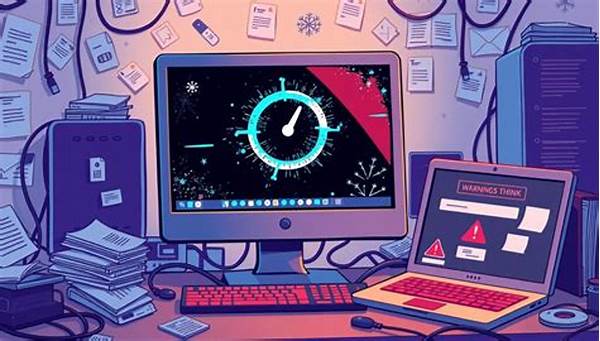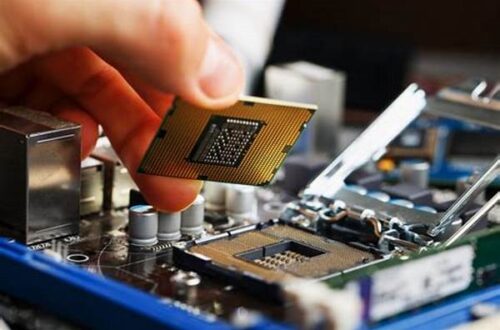Experiencing frequent computer freezing can be a source of immense frustration for users relying on their devices for both personal and professional activities. When a computer freezes, it disrupts workflow, causes potential data loss, and requires time-consuming troubleshooting. Understanding the underlying causes of frequent computer freezing can help users remedy the situation, ensuring their devices operate smoothly and efficiently. In this article, we will explore the various factors contributing to this issue and provide insights into how users can address these problems effectively.
Read Now : “customizing Bios For Performance”
Common Causes of Frequent Computer Freezing
There are several common causes of frequent computer freezing, each of which can disrupt the normal operation of your device and hinder productivity. Firstly, inadequate hardware specifications often contribute to this issue. Computers that lack sufficient RAM, for instance, may become overloaded when running multiple applications at once. This overloading can cause the system to freeze as it struggles to manage processes. Moreover, outdated or corrupted drivers can also result in frequent freezing. Drivers act as a bridge between the operating system and hardware; if they are not working correctly, your computer may struggle to perform basic functions smoothly.
Another significant cause is malware or viruses, which can infiltrate and disrupt system processes, leading to instability and freezing. Regular updates and scanning can mitigate this risk. Furthermore, overheating due to poor ventilation or high CPU usage can cause the system to freeze. Maintaining a clean and well-ventilated environment and using cooling solutions can help prevent overheating. Lastly, software conflicts or bugs, especially in newly installed applications, can contribute to frequent computer freezing. Ensuring compatibility and regularly updating software can help reduce these incidents.
Detailed Explanations of Frequent Freezes
1. Hardware Limitations: One of the primary causes of frequent computer freezing is insufficient hardware resources. Systems with limited RAM or outdated processors may struggle to perform tasks, particularly when multitasking, leading to repeated freezing.
2. Outdated Drivers: A frequent cause of freezing is outdated or incompatible drivers. These drivers are essential for hardware to communicate with the operating system. When they malfunction, it often results in a frozen system.
3. Malware and Viruses: Malicious software can heavily burden system resources, leading to frequent computer freezing. Ensuring robust antivirus protection and regular system scans can mitigate these disruptions.
4. Overheating Issues: Computers that overheat due to insufficient cooling or excess dust can experience freezing. It is essential to keep your system’s cooling mechanisms working efficiently to avoid this.
5. Software Conflicts: New or conflicting software may result in frequent computer freezing. Ensuring all software is up-to-date and compatible with your operating system can help in reducing this problem.
Understanding System Overload and Its Effects
System overload happens when a computer’s resources are insufficient to handle the demands placed upon it. This situation is a leading cause of frequent computer freezing, directly impacting the device’s performance and the user’s efficiency. When a computer becomes overloaded, it can no longer effectively manage processes. This state could arise due to running too many applications simultaneously, especially if the available RAM is inadequate or the CPU is overstressed. Consequently, the system may struggle to keep up, resulting in frequent freezing episodes.
Addressing system overload requires a strategic approach. Users can begin by optimizing their device’s startup programs, reducing the number of applications that automatically launch with the system. Regularly closing unused applications also helps to free up resources. Upgrading hardware, such as adding more RAM or investing in a faster processor, can provide a more permanent solution. Additionally, users should monitor system performance using in-built tools or third-party applications to ensure that their device operates within its capabilities, preventing frequent freezing.
The Role of Maintenance in Preventing Freezes
1. Regular Updates: Ensuring your operating system and applications are up-to-date can prevent software conflicts and bugs that lead to freezing.
2. Routine Scans for Malware: Conducting regular antivirus scans can help in identifying and eliminating malicious software that may cause frequent computer freezing.
3. Hardware Cleaning: Keeping the computer’s hardware clean prevents overheating, a common reason for system freezes.
4. Proper Ventilation: Ensuring your computer has adequate ventilation helps prevent overheating and subsequent freezing.
5. Disk Cleanup: Regularly removing unnecessary files and managing disk space can prevent freezing caused by storage issues.
Read Now : Improving User Interaction Speed
6. Monitoring System Performance: Using performance monitoring tools can help identify and address potential problems before they lead to freezing.
7. Driver Updates: Regularly updating drivers ensures hardware operates correctly, preventing freezes.
8. Secure Network: Ensure your network is secure to protect against threats that could introduce freezing issues.
9. Compatibility Checks: Always ensure new software is compatible with your current system to avoid conflicts and freezing.
10. Professional Maintenance: Periodically consulting with IT professionals can catch and mitigate issues that might lead to freezing.
Impact of Software Issues on System Stability
Software issues are a pivotal cause of frequent computer freezing, often overlooked by users focusing primarily on hardware problems. Conflicting or poorly optimized software applications can dominate resources, causing the system to freeze. In some cases, software bugs or improper installations create disruptions in how applications interact with the operating system, contributing to instability. This situation can be exacerbated by running multiple demanding applications simultaneously, exhausting available resources and subsequently leading to a frozen state.
To mitigate these issues, users must practice diligent software management. Starting with regular updates, users should ensure that all applications and the operating system are current, as updates often contain critical patches that address bugs and enhance performance. Additionally, uninstalling unnecessary or seldom-used applications can free up resources and reduce the chances of conflicts. Utilizing system tools or third-party applications to clean the registry and defragment the hard drive may also improve efficiency. By addressing these software concerns, users can significantly reduce the incidence of frequent computer freezing and enhance overall system reliability.
Prevention Strategies for Frequent Freezing
Understanding and mitigating the causes of frequent computer freezing is essential for maintaining an efficient and stress-free computing experience. Adopting preventive strategies can significantly enhance your system’s performance and reliability. One of the foremost strategies involves ensuring your computer’s hardware is up-to-date and well-maintained. Upgrading components like RAM and using quality cooling solutions can alleviate strain on the system, reducing freeze incidents.
Equally important is maintaining robust software health. Regularly updating your operating system, applications, and drivers ensures compatibility and smooth operation, effectively reducing freezing. It’s equally crucial to practice safe computing habits, such as avoiding suspicious downloads and running antivirus scans, to protect against malware which is a known cause of system slowdowns and freezing. Moreover, efficient management of resources by minimizing background applications and avoiding multitasking with high-demand software can also help in preventing freezes.
Finally, fostering a routine that includes regular backup of data and system checks can provide peace of mind, ensuring that even if freezes occur, your data and settings remain secure and recoverable. By proactively addressing these factors, users can prevent frequent computer freezing, ensuring their devices perform optimally.
Summary of Preventive Measures
To conclude, understanding the causes of frequent computer freezing and implementing preventive measures effectively can save significant time and effort while enhancing user experience. Begin by recognizing that hardware limitations, such as inadequate RAM or aging processors, play a critical role in this issue. Upgrading these components can provide an immediate boost to performance and reduce freezing incidents. Moreover, maintaining a clean and cool environment for your computer can avert overheating-related freezes.
In addition to hardware considerations, managing software efficiently is equally crucial. Regularly updating applications, operating systems, and drivers ensures optimal compatibility and performance. It’s also advisable to avoid overloading the system with excessive tasks or resource-heavy software concurrently, as this places undue strain on your computer. By implementing robust antivirus solutions and practicing safe browsing, users can protect their systems from malware, a common cause of freezing. Continual vigilance and proactive maintenance strategies will not only prevent frequent computer freezing but also extend the longevity and efficiency of your device, contributing to a seamless digital experience.





